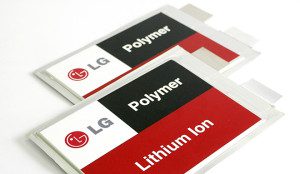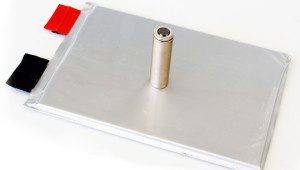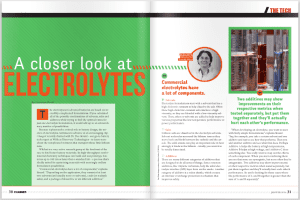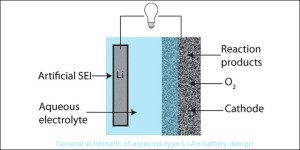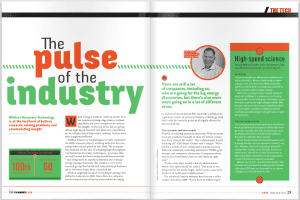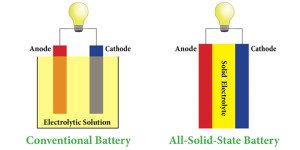The DOE has announced nearly $16 million in funding from its Technology Commercialization Fund (TCF), which has a mission to help businesses move promising energy technologies from the DOE’s national laboratories to the marketplace. This round of funding will support 54 projects at 12 national labs, involving 52 private-sector partners. EV-related TCF awards include: Manufacturing… Read more »
Search Results Found For: "dendrite"
LG Chem to license Optodot’s boehmite ceramic-coated battery separators
Optodot Corporation has granted a license to LG Chem for batteries, cells, separators and electrolyte members comprising boehmite, an aluminum oxide hydroxide mineral. The license permits LG Chem to use boehmite separator films for lithium-ion batteries. “Boehmite ceramic coating layers offer a number of distinct benefits in lithium-ion batteries, including improved thermal stability to enhance… Read more »
Stanford team develops Li-metal anodes
Lithium-metal anodes are the favored solution for next-generation Li-air or Li-sulfur batteries for various reasons, including their high specific capacity (theoretically tenfold higher than graphite). However, safety issues resulting from dendrite formation and instability caused by volume expansion have slowed the development of commercially viable solutions. In “Composite lithium metal anode by melt infusion of… Read more »
A closer look at electrolytes in advanced batteries
The electrolytes in advanced batteries are based on incredibly complicated formulations. If you calculated all of the possible combinations of solvents, salts and additives while trying to find the optimal ratios for just one electrolyte formulation, it would add up to an extraordinary number of possibilities. Because it plays such a critical role in battery… Read more »
Sony working on high-capacity lithium-sulfur and magnesium-sulfur batteries
Sony, the company that introduced the world’s first commercial lithium-ion battery in 1991, is already well along the road to a Li-ion replacement, according to Nikkei Technology. The company is reportedly developing high-capacity lithium-sulfur and magnesium-sulfur batteries, aiming for a 40% increase in volumetric capacity to 1,000 Wh/l, and plans to commercialize the new chemistries… Read more »
DOE offers $56 million in funding for transportation technology research
In January, the DOE is expected to make around $56 million in new funding available for transportation-related R&D projects. The Vehicle Technologies Program Wide Funding Opportunity Announcement describes how organizations can apply for grants to support the development of such vehicle technologies as advanced batteries, power electronics and electric motors. Areas of Interest include: EV… Read more »
Cambridge scientists claim promising lithium-oxygen battery advancements
Cambridge scientists have developed a working demonstrator of a lithium-oxygen battery that is more than 90% efficient, and can be recharged more than 2,000 times. Lithium-oxygen, or lithium-air, has been touted as the ultimate battery technology, because its theoretical energy density is ten times that of lithium-ion solutions. In “Cycling Li-O2 Batteries via LiOH Formation… Read more »
Another Chinese-backed startup announces plans for an electric supercar
New EV companies are cropping up like dendrites on a lithium metal anode. The latest startup to emerge from stealth mode is called NextEV. Like many of the current crop (see Faraday Future, Atieva, Fisker, Leshi), NextEV is backed by Chinese investors, and is not affiliated with a traditional automaker, although it has recruited execs… Read more »
Wildcat Discovery Technology creates new experiments to accelerate battery research
The pulse of the industry: Wildcat Discovery Technology is at the forefront of battery research, solving problems and accumulating insight. When Charged wants to catch up on the newest trends in cutting-edge battery technology, there are a few companies we turn to for insight. At the top of the list is a group whose high-speed… Read more »
PATHION’s superionic solid-state electrolytes point to more powerful and safer batteries
Solid-state electrolytes are the talk of the town these days. California-based PATHION has been working to commercialize solid electrolytes since its founding in 2012, building on its exclusive license from Los Alamos National Laboratories for a promising material called Lithium-Rich Anti-Perovskite (LiRAP). At the recent Materials Research Conference, PATHION presented two new superionic solid-state electrolytes built upon… Read more »





